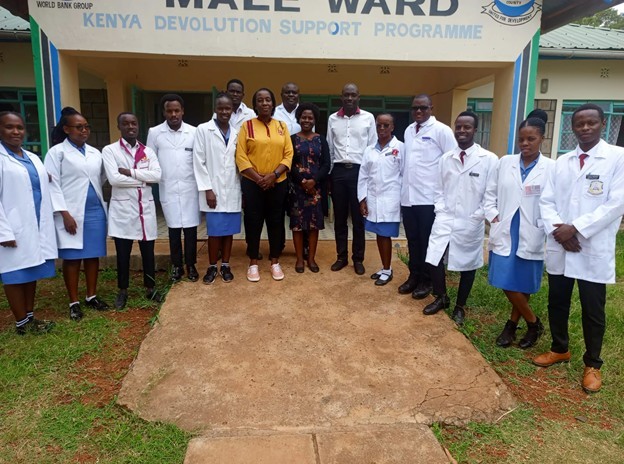
MEET A PHD HOLDER WHO DECIDED TO STUDY AT KMTC
Most people see a PhD as the peak of academic achievement. But for 42-year-old Martin Ogwang, it was just another step in his lifelong pursuit of knowledge. Despite holding a doctorate in Biochemistry, a Master’s in Bioinformatics from Jomo Kenyatta University of Agriculture and Technology (JKUAT), and a Bachelor’s degree from Makerere University, he made an unexpected choice by enrolling at the Kenya Medical Training College (KMTC).
Why would a university don decide to wear a uniform and go back to school?
Three years ago, on a chilly Tuesday morning, Martin embarked on a journey that would bring him closer to earning a Diploma in Clinical Medicine at KMTC Bungoma Campus. “I had long desired to join KMTC to study the course, but fate had it otherwise,” he says. “When an opportunity finally presented itself, I grabbed it with open arms. I wore my uniform and set off for College,” he continues.
At JKUAT, where he is a lecturer, Martin is deeply engaged in research.”But I realized I needed more practical skills in clinical techniques. I wanted to understand it better to enable me to review student assignments on the subject,” he explains. For this reason, Martin, a father of two, applied to KMTC with the hope of sharpening his skills to improve his work.
Three years on, having successfully completed his studies, Martin is preparing to graduate in December. “I can’t wait for that day to come. It will be a defining moment for me,” he shares with a smile.
While at the College, he led a quiet life, with very few people knowing about his impressive academic achievements. “I did not want anyone, including my lecturers, to know my history. When people find out, especially when you are a university don, they start giving you special treatment, which I did not want,” he says.
For Martin, studying at KMTC was about more than just earning another qualification. “I wanted to learn why KMTC graduates are in such high demand locally and internationally. This knowledge would be useful when I return to JKUAT, where I plan to recommend changes to help our students compete globally,” he explains.
“One of the things that, in my view, makes KMTC marketable is its curriculum. It aligns with international standards,” he continues. According to him, if other institutions in Kenya adopted KMTC’s approach, “I believe we could, to some extent, address unemployment in the country.”
Martin is equally impressed by how KMTC conducts its examinations.
“The way exams are administered here is remarkable. I have never seen a process so secure that even the examiners do not know the set questions. This is something we could adopt at the university,” he states. Besides his work at the university, Martin hopes to practice as a clinician.
“My next steps are to acquire a license and begin practicing. I have longed to do this, and now it is slowly becoming a reality,” he states.
But how does he balance his roles as a student, lecturer, and family man? He says he managed it by taking fewer classes at the university. “I arranged with my students to have a flexible teaching schedule, like on Fridays and sometimes on Saturdays. This flexibility made it possible for me to study while working and supporting my family,” he says.
In his parting words, Martin emphasizes, “Education has no boundaries. No matter how old you are, you can always go back to school and gain new skills.”
Ends…